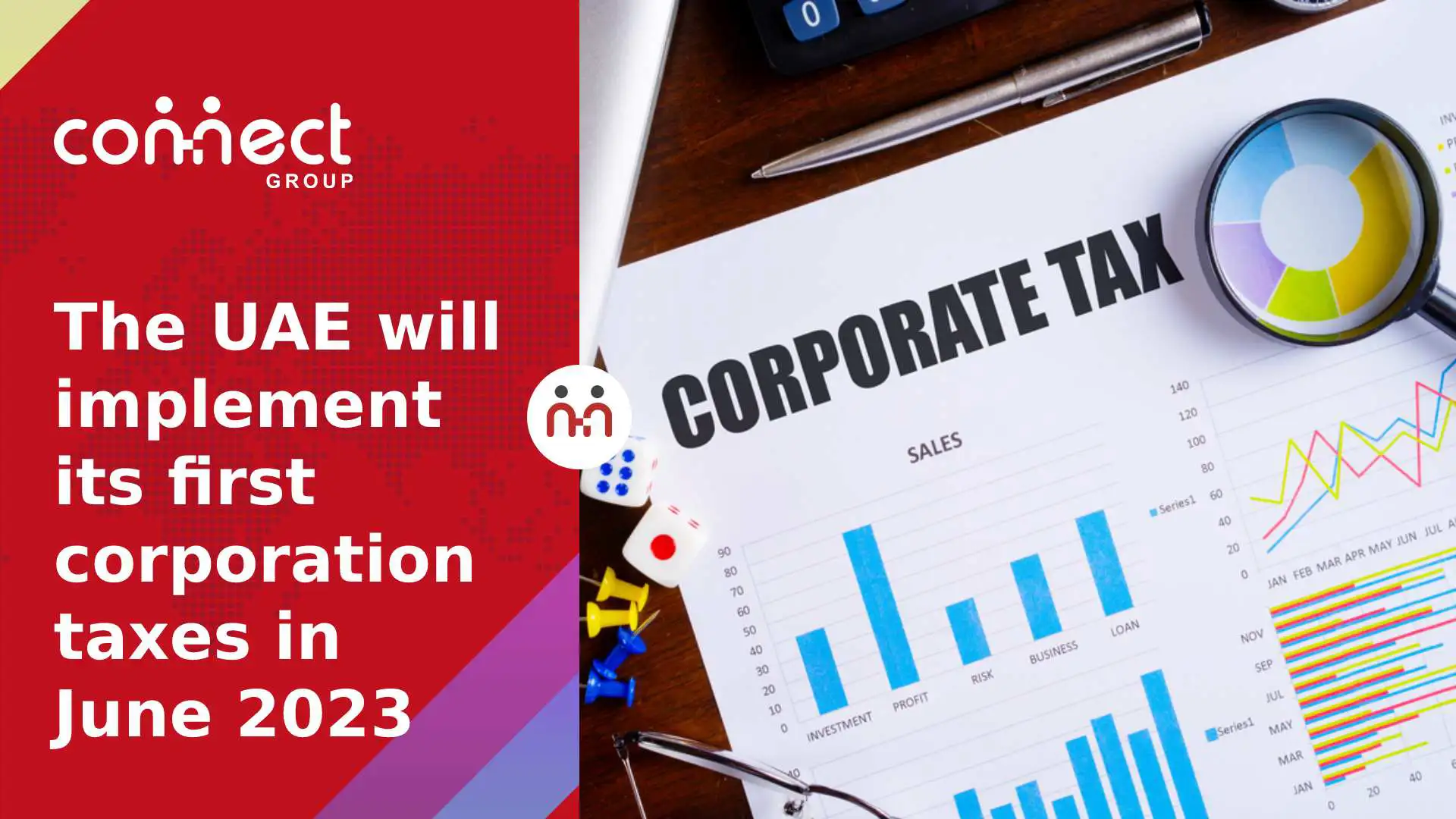For the first time, the United Arab Emirates will levy a federal corporate tax on business profits. This was announced by the Ministry of Finance on January, 31st. The announcement marks a significant shift for a country that has long attracted businesses from all over the world due to its status as a tax-free trade hub.
In this article, you will learn everything about the future corporate taxes in the UAE. You will know all the details about this new government announcement and how businessmen must prepare for it. Let us take a look:
- What is the corporation tax?
- Coverage and exclusions
- When will the date of applicability and compliance become effective?
- What will the corporate tax rate be?
- Other peculiarities
- What do the experts have to say?
- How can Connect Group help you?
Table of Contents
ToggleWhat is the Corporation Tax?
A corporate tax is a direct tax levied on the profits or capital of corporations or similar legal entities. Many countries levy such taxes at the national level, and a comparable tax may be imposed at the state or local level. They also call it income tax or capital tax. A country’s corporate tax may be levied on:
- Nationally incorporated corporations
- Corporations that do business in the country rely on income from that country
- Foreign corporations with a permanent presence in the country
- Corporations are deemed to be tax residents in the country
Hence, company taxable income is frequently calculated in the same way that individual taxpayers’ taxable income is. In general, the tax is levied on net profits. In some jurisdictions, the rules for taxing corporations may be significantly different from those for taxing individuals. Certain corporate acts or entities may be exempt from taxation.
Thus, the incidence of corporate taxation is a hotly debated topic among economists and policymakers. Evidence suggests that some of the corporate tax falls on capital owners, workers, and shareholders. However, the ultimate incidence of the tax is unknown.
Our agency, Connect Group, can answer all your questions related to corporate tax in the UAE. Plus, we can assist you with VAT in the UAE.
Coverage and Exclusions
Corporate tax is a type of direct tax levied on corporations and other businesses’ net income or profit. The UAE Corporate Tax will be implemented at the federal level, and thus will apply to all Emirates. We have summarized the coverage and exclusions of the corporate tax regime below:
Coverage:
- All businesses and commercial activities in the UAE are the same. However, the exception is for the extraction of natural resources which will remain subject to Emirate level corporate taxation
- Any business conducted by a legal entity. Moreover, we can help you to set up an LLC in the country
- Activities performed under the auspices of a freelance permit
- Individuals with a commercial license who generate business income
Additionally, we can help you to obtain a Golden Visa and a Dubai Work Remote Visa, for example.
Exemptions:
- Natural resource extraction businesses and commercial activities
- Individuals earn interest and other income from bank deposits or savings plans
- Individuals earn a salary or other form of employment income
- Dividends, capital gains, and other income derived from personal ownership of shares or other securities
- Dividends and capital gains received by a UAE company from qualifying shareholdings
- Qualifying intra-group transactions and reorganizations
It is important to note that the availability of the aforementioned exclusions is subject to certain conditions. They will be outlined in regulation and guidance.
Free Zone and Financial Free Zone Applicability
- Businesses operating in free zones (including financial free zones) in the UAE will be subject to Corporate Tax. It is clarified, however, that the Corporate Tax regime will continue to honor the corporate tax incentives currently offered to free zone businesses. FZ companies that comply with all regulatory requirements and do not conduct business with mainland UAE.
- Businesses operating in a free zone must register and file a corporate tax return.
The Applicability of the Law to Foreign Nationals
- Foreign entities and foreign individuals will be subject to Corporate Tax only if they conduct ongoing or regular trade or business in the UAE.
- A foreign investor’s income from dividends, capital gains, interest, royalties, and other investment returns will generally be exempt from Corporate Tax.
When Will the Date of Applicability and Compliance Become Effective?
First Financial Year
The UAE Corporate Tax regime will go into effect for fiscal years beginning on or after June 1st, 2023. Hence, we have summarized a few cases with different fiscal years and their corresponding effective dates for corporate tax as follows:
Financial Year adopted by UAE entity:
- Firstly, 1st July 2023 – 30th June 2024.
- Secondly, 1st January 2023 – 31st December 2023.
- Thirdly, 1st October 2022 – 30th September 2023.
The effective date for Corporate Tax:
- Firstly, 1st July 2023.
- Secondly, 1st January 2024.
- Thirdly, 1st October 2023.
Compliance to be carried out
- Your businesses will need to register for Corporate Tax separately. We are waiting for more information on the registration process from the Ministry.
- Each fiscal period, you only have to file one corporate income tax return (electronically).
- There will be no need for provisional or advance corporate tax filings.
- Similarly, UAE businesses will not have to make advance tax payments.
What will the Corporate Tax Rate Be?

- All annual taxable profits less than AED 375,000 are subject to zero rates.
- All annual taxable profits over AED 375,000 would be subject to a 9% tax rate.
- Lastly, specific companies would be subject to different rates under the OECD’s BEPS rules. These companies are:
- All multinational enterprises (MNEs) that fall under the scope of the OECD’s base erosion and profit shifting (BEPS) 2.0 frameworks. Namely, consolidated global revenues over AED 3.15 billion.
On the other hand, accounting profits subject to certain adjustments and exemptions are referred to as taxable profits. For example:
- Dividends from qualifying shareholdings
- Capital gains
- Profits from group reorganizations or intra-group transactions
Other Peculiarities
- Tax Group: The UAE Corporate Tax Regime allows UAE groups of companies to form a tax group as a single taxable person. However, this is subject to certain conditions. Additionally, this will require only a single tax return for the entire group.
- Losses: Here the regime will allow businesses to use losses incurred (as of the effective date of UAE Corporate Tax). This will be in order to offset taxable income in subsequent fiscal periods. Furthermore, one group company’s tax losses may be used to offset the taxable income of another group company (subject to certain conditions).
- Withholding tax: Under the Corporate Tax regime, no withholding tax will be levied on domestic or cross-border payments of any kind.
- Foreign corporate tax credit: It is clarified that foreign corporate tax paid on UAE taxable income will be allowed as a tax credit against UAE corporate tax liability.
- Transfer pricing: It is clarified that UAE businesses must follow Transfer Pricing rules and documentation requirements established in accordance with the OECD Transfer Pricing Guidelines.
- Noncompliance: It is made clear that noncompliance will result in severe penalties.
- Authority: The Federal Tax Authority will be in charge of corporate tax administration, collection, and enforcement. Nevertheless, the Ministry of Finance will continue to be the “competent authority” for the purposes of bilateral/multilateral agreements and international tax information exchange.
What Do the Experts Have to Say?
People You Should Know
- Chris Payne: He is the chief economist at Dubai-based Peninsula Real Estate. (Additionally, Connect Group is a specialist in real estate services).
- Mark Hemmings: Who is vice president of tax and treasury at Dubai-based specialty services firm Kent.
- Rupert Tait: Co-founder of Procurified, a UAE-based construction tech start-up
Sensible and Practical
While the news caused controversy after it was announced, many in the UAE’s business community say it should not have come as a surprise. In this regard, Chris Payne stated that he did not think this announcement should come as a surprise. This is because corporation tax has been discussed in the UAE for several years.
He also said that there is already corporation tax in the GCC, for example, in Saudi Arabia and Qatar. The UAE seeks to diversify its economy away from hydrocarbon revenue. Hence, the Federal government must establish sources of income that are not reliant on corporate dividends.
Also, they should not come from investment income, both of which can be volatile, Payne added. So, the announcement gives companies in the UAE roughly a year and a half to prepare for taxes. However, opinions on whether the move will allow the Gulf sheikhdom to retain its attractiveness to businesses are mixed.
On the other hand, the decision is “practical and sensible,” according to Mark Hemmings. Mr. Mark also said it would be very interesting to see the details. He added that at first glance, this appears to be a practical and sensible approach. This is to ensure companies in the UAE can comply with the anticipated new international tax rules. While also ensuring the UAE remains an attractive location for businesses to operate.
Start-ups Facing Headwinds?
Nonetheless, the threshold for being subject to taxation (just over $100,000 in profit per year) is relatively low. Also, it may disadvantage smaller businesses with high start-up and renewal costs. Rupert Tait sees potential challenges for small businesses like his.
In addition, he added that as a startup founder, he believes we want to base ourselves in the most affordable environment to grow. “While I understand the need for taxation to begin—he starts to say—I also know we are indirectly taxed in FZ”.
He also explained that his company, which is based in the Dubai Multi Commodities Centre free zone, already pays AED per year, regardless of profit. Lastly, he said, “As a result of the heavy upfront fees and then tax once the business is profitable, the corporate tax may cause SMEs to reconsider where they plan to remain (long-term)”.
Despite this, the proposed tax remains low in comparison to other low-tax hubs around the world. On the other hand, we can help you to set up a business in a free zone, such as JAFZA and RAKEZ.
How can Connect Group Help You?
The introduction of a corporate tax for all businesses in the UAE is historic tax reform in the UAE’s tax regime. It is a welcome move by the UAE Ministry of Finance to give taxpayers ample time. Namely, the necessary time to prepare for the corporate tax regime before the effective date of applicability.
In addition, you will need someone by your side to assist you in this new process. Hence, since we are an experienced company, we can help you to be prepared for 2023. As a result, you will be able to concentrate on making more money while we handle all the paperwork and legal stuff.
Would you like to contact Connect Group to obtain more information on the future corporate taxes in the UAE? If you have any questions, send us an email at [email protected]. Then, you will talk to one of our representatives who will answer your questions.
Apply today by sending us your CV to thetalentpoint.com. Furthermore, we will not store CVs that you send to [email protected].






